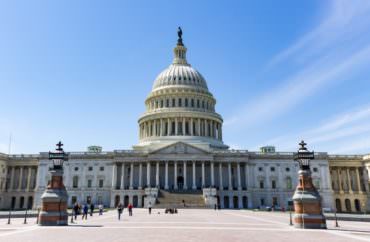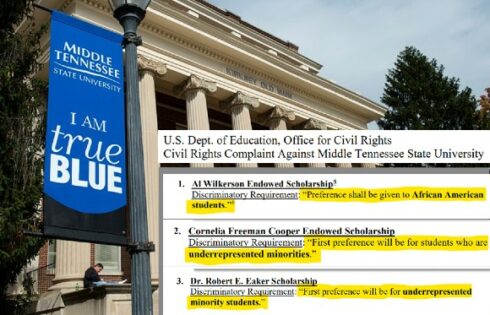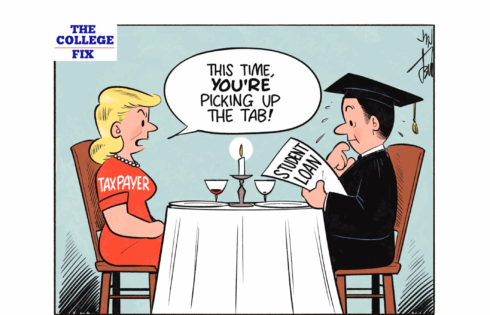
Two prominent Republican lawmakers have proposed a bill that would compel universities to follow the recent Supreme Court ruling banning affirmative action by creating a new arm of the government charged with enforcement.
Sen. J.D. Vance of Ohio and Rep. Jim Banks of Indiana recently introduced the College Admissions Accountability Act, which would establish a “Special Inspector General for Unlawful Discrimination in Higher Education.”
The proposal follows the June decision by the U.S. Supreme Court that outlawed using race as a factor in college admissions.
“This bill creates the means necessary to enforce the court’s decision and hold colleges and universities accountable for illegal discrimination on the basis of race,” Vance told the Washington Free Beacon. His office declined to comment to The College Fix.
The bill is not limited to the enforcement of admissions decisions, but also applies to decisions by a college or university relating to financial aid or any other policies or practices on campus that would illegally discriminate based on race.
Banks, in a news release on the bill, said universities found guilty of discrimination would be required to enact corrective measures or face a loss of federal funding. The Indiana Democratic Party did not respond to The College Fix’s request for comment.
“Unlawful discrimination based on race for college admissions is really just ‘the tip of the discrimination iceberg,’” economist Mark Perry* told The College Fix.
Restrictions on admissions alone “will only affect a small number of about 50 of the most selective and elite colleges and universities in the US that admit fewer than 30% of applicants,” he said. “Therefore, [they] must find ways like lowering academic standards for blacks and Hispanics to meet their ‘student diversity’ goals.”
For Perry, far more discrimination happens to admitted students during their time on campus. He said almost all 4,000 colleges and universities across the nation offer various women’s-only Hispanic-only, black-only or minority-only scholarships, fellowships, awards, programs and more.
“It’s that widespread,” he said, adding he supports the creation of an inspector general to put a stop to it.
The bill calls for the position to be appointed by the president with the counsel of the Senate. The inspector general would “review any Federal policies and programs that have the effect of incentivizing covered institutions to violate the Equal Protection Clause or Title VI,” according to the proposal.
The bill’s wording suggests some administrators have openly said they will seek to circumvent the Supreme Court’s ruling.
“Several American colleges and universities issued statements or unveiled new policies at odds with its letter and spirit,” the bill states. “Institutions of higher education, including their offices of admission, must comply with the Constitution and laws of the United States, as interpreted by the judiciary.”
The bill was introduced in December and has been referred to the Senate Health, Education, Labor, and Pensions committee.
Hans Bader, a Washington D.C.-based civil rights attorney, told The College Fix the primary function of the bill is to ensure that higher education’s bureaucracies don’t impede the court’s ruling from being carried out. He said this will ensure speedy compliance.
“Right now, legal restrictions on racial preferences under Title VI are enforced by the Education Department’s Office for Civil Rights,” Bader said via email. “OCR is slow: It took OCR well over a decade after a complaint was filed to rule that a race-based scholarship in Kentucky public universities violated Title VI, in 2017.”
He said there are several examples of this sluggish or sometimes fluid response from the office.
Given how long the office takes to make decisions, Bader said he believes that the new inspector general will “change that enforcement dynamic, and create an office much more likely to zealously enforce bans on racial preferences.”
Rather than wait on the OCR, complaints can be filed in a more streamlined way directly to the inspector general, he said.
The center-right National Association of Scholars has also endorsed the bill.
“In word and deed, colleges and universities have made clear that they intend to continue to discriminate on the basis of race. They need to know that their unlawful actions will lead to clear consequences, and this is the great wisdom of the College Admissions Accountability Act,” the group said.
*Mark Perry is a paid consultant for The College Fix on a topic unrelated to this article.
MORE: TRENDING: GOP lawmakers try to tax ‘woke’ private universities’ massive endowments
IMAGE: Shutterstock
Like The College Fix on Facebook / Follow us on Twitter






Please join the conversation about our stories on Facebook, Twitter, Instagram, Reddit, MeWe, Rumble, Gab, Minds and Gettr.